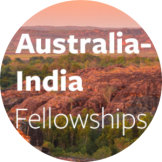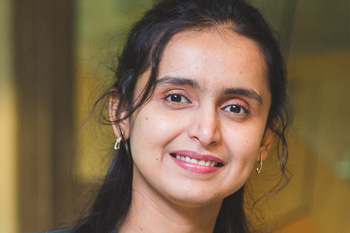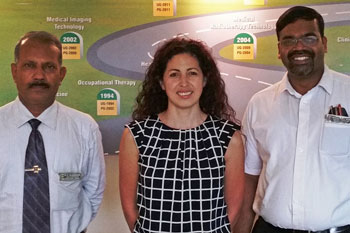Australia–India Strategic Research Fund (AISRF) Early- and Mid-Career Fellowships


Program highlights
- The AISRF EMCR Fellowships support Australian early and mid-career researchers to undertake a one to three month collaborative research visit with leading Indian institutions, strengthening Australia–India science partnerships.
- Fellows receive flexible support towards travel and living costs, including airfare, visa and insurance, and in-country travel, noting the fellowship does not cover bench fees, project costs or institutional overheads.
- The fellowship is designed for deep engagement, enabling cultural immersion in India’s research environment while building collaborations and networks that continue beyond the visit.
- Established in 2006, the AISRF marks its 20th anniversary in 2026, recognising two decades of Australia–India scientific collaboration and the partnerships these fellowships continue to grow.
The Australian Academy of Science invites applications for round 5 of the Australia–India Strategic Research Fund (AISRF) Early- and Mid-Career Researcher (EMCR) Fellowships. The EMCR Fellowships are one component of the broader AISRF, Australia’s largest bilateral science collaboration initiative with India, jointly managed and funded by the governments of Australia and India.
These fellowships enable Australian researchers to undertake collaborative research with prominent Indian institutions, strengthening enduring partnerships in science, technology and innovation between the two countries. Each fellowship provides funding of up to A$17,500 to support travel and collaboration for a period of between one and three months.
The program is designed to foster meaningful, long-term connections by supporting researchers to expand their international networks, enhance their understanding of India’s research systems and culture, and develop as future leaders and science ambassadors. Fellows are expected to establish substantial research links that will extend beyond the initial visit and contribute to ongoing collaboration and knowledge exchange.
Applicants are required to propose a well-defined research project or targeted activity, developed in close consultation with their confirmed host organisation(s) in India. Proposals must demonstrate clear scientific merit and show how the proposed work will contribute to the broader aims of the program.
These fellowships are not intended to supplement or extend study or sabbatical leave, nor to support visits where the primary purpose is to attend a conference. The focus remains on supporting substantive, collaborative research activities that align with the objectives of the AISRF.
Key dates
Below are the key dates for the application process. While we aim to keep to this schedule, some dates may change depending on circumstances.
GUIDELINES
The following guidelines provide important information about eligibility, submission requirements, and assessment processes. Please review them carefully before submitting an application.
Applicant eligibility
To be eligible for consideration, an applicant must:
- be an Australian citizen or permanent resident based in Australia (including the Special Category Visa, Subclass 444) at the time of application
- be living in Australia at both the time of application and time of travel
- be employed as a scientist/faculty member of an eligible Australian research organisation as defined below
- have a PhD awarded no more than 15 years prior to the grant application deadline. An extension to this limit may be approved in the case of significant career interruptions.
Project eligibility
To be eligible for consideration, projects must:
- be a genuine collaboration between an Australian EMCR and an Indian research partner, employed at a research organisation located in India
- focus on substantial research activity; the primary purpose cannot be attendance at a conference or short-term networking only.
Fields of research
Researchers working in any field of natural science (basic or applied), engineering, mathematics, statistics or health are eligible to apply. Multidisciplinary projects are encouraged, provided they include a significant research component in an eligible field.
In addition to these broad fields, applicants are strongly encouraged to consider how their proposed project may align with Australia’s National Science and Research Priorities, particularly in areas such as:
- Transitioning to a net zero future, including research supporting innovative emissions reduction and clean energy technologies.
- Supporting healthy and thriving communities, such as research that contributes to improved preventive health, mental wellbeing, or equitable health outcomes.
- Elevating Aboriginal and Torres Strait Islander knowledge systems, through respectful collaboration and research that recognises and preserves traditional knowledge and cultural heritage.
- Protecting and restoring Australia’s environment, including research into biodiversity conservation, ecosystem restoration, and sustainable management of land and water resources.
- Building a secure and resilient nation, for example, research that strengthens biosecurity, critical infrastructure resilience, or sustainable food and water systems.
Projects solely in the humanities, social sciences or behavioural sciences are not eligible for this fellowship.
Eligible Australian research organisations (EROs)
Applicants must be employed by an eligible research organisation, including:
- Australian tertiary education institutions (as defined in the Higher Education Support Act 2003)
- Australian cooperative research centres
- publicly funded research agencies
- state- or territory-funded research organisations
- Australian public or private research companies
- Australian not-for-profit research organisations
- other incorporated Australian entities.
An ERO must be registered for GST, and if a university, must be exempt from income tax. Non-corporate Commonwealth entities (as defined under the Public Governance, Performance and Accountability Act 2013) are not eligible.
Each successful fellow may receive up to A$17,500, comprising:
- an international economy airfare to India (up to A$3,500)
- a one-off allowance for visa, travel, and medical insurance costs (up to A$1,000)
- a one-off allowance for in-country research-related travel within India (up to A$1,000)
- a living allowance of A$4,000 per month (up to a maximum of A$12,000 for a 12-week visit).
Fellows are responsible for arranging their own travel, accommodation, insurance, and visas, in consultation with their host organisation as appropriate. Dependants may accompany fellows at their own cost. The fellowships do not provide additional funding for bench fees, project costs or institutional overheads.
Visits must be for a minimum of four weeks and a maximum of 12 weeks. Travel should commence from 1 January 2026 and be completed by 31 December 2026.
Applications must be submitted via the Good Grants online portal, and include the following material and supporting documentation:
- short CV (maximum of three pages)
- copy of PhD degree
- letter of support from the relevant delegate at the applicant’s home institution
- letter of invitation from the relevant delegate at the host researcher’s institution
- referee report. See the referees’ information sheet (PDF download below) for details on what to provide the referee, and what the referee should include in the written report.
Applications must be complete at the time of submission to be considered. Incomplete applications, including those missing any required supporting material, will be deemed ineligible and will not proceed to merit assessment.
Proposals will be assessed on the:
- scientific merit of the proposed research project
- demonstrated achievements of the applicant in the context of their career to date
- leading-edge research capacity of the proposed host researcher and institution
- value of the expected outcomes to Australian science and the broader Australia–India research relationship
- potential for the application to positively impact the participation of women in scientific research and technology projects
- potential for the project to foster long-term collaborative relationships with Indian research partners and build international engagement capacity of the applicant
- alignment with Australia’s National Science and Research Priorities.
The Academy is committed to ensuring that all eligible researchers are assessed equitably. Applications are considered carefully against the selection criteria by a committee of scientists with diverse expertise. Applications will be considered relative to each applicant’s career stage and opportunities available to them. Achievements and research outcomes will be assessed in the context of the time since the applicant’s PhD (or equivalent) was awarded, recognising that comparable excellence may look different for researchers five years post-PhD compared to those with fifteen years of postdoctoral experience.
The decisions of the assessment committee are based on the assessed competitiveness of the proposal. The Academy does not enter into discussion or correspondence regarding the reasons why an application is successful or not.
Applicants can only be awarded a single AISRF Fellowship grant, as decided by the Academy.
Fellowship recipients must submit a final report within three months of returning to Australia, outlining the collaboration’s progress, outcomes, and a full financial acquittal. Fellows may also be asked to provide updates during or after the fellowship period.
Applications are to be completed through an online form found by clicking on the Apply button on the top right of this web page when the round is open.








